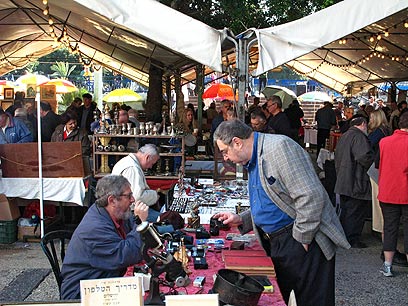
Hitler: Not yet cultural icon
צילום: ויז'ואל/פוטוס
Nazi souvenirs on sale in Tel Aviv
If it happened in any other country, we'd be crying 'anti-Semitism!' but it's happening in the first Hebrew city in broad daylight. And yes, there are customers
"If you buy this Nazi medal, I'll throw in the Hitler postcard at half price."
On Friday afternoon at Tel Aviv's Dizengoff Square flea market, among the antique porcelain, collector's vinyl records and vintage clothes, I suddenly see a portrait of Hitler on a stamp. Next to the stamp are a number of postcards sent home by SS officers in the 1940s, signed off with the infamous salutation "heil."Then I see medals, coins, banknotes and letters – all authentic, all from the time of the Third Reich, and all displayed in broad daylight in the first Hebrew city, on sale in exchange for Israeli currency. Each item bears the notorious swastika, the symbol that flashed before the eyes of millions before they were led to their murder.
I am tempted to confront the manager of the stall holders, who allows money to be made from our nation's terrible trauma, but I shy away from the dark corners. One of the traders explains, "I sell antiques that have historic value, and the rest doesn't interest me." He has no qualms about his trade.
After an hour of looking around, I realize that the really valuable items are not even displayed. They are hidden away in bags and drawers, perhaps to keep them from the eyes of the police or passers-by, or because of feelings of guilt.
I ask one stall holder if he sells SS paraphernalia. He seems stressed out to hear the word, and stares at me for a long moment before hauling out a suitcase and showing me various Nazi collectors' items costing hundreds of shekels.
There is an SS first aid kit, designed to be attached to a motorcycle – NIS 2500 ($670) before haggling. I wonder aloud if the prices are overinflated. "Of course they are," he says smiling. "The Third Reich is the king of collectibles."

Nazi memorabilia at Tel Aviv's flea market (Photo: Zvika Tishler)
Recently, it seems that for many this is indeed true. Nine months ago, right-wing groups around the world celebrated Hitler's 120th anniversary. These celebrations were accompanied by all sorts of sickening sales. It's hard to make a buck from suffering and atrocities, so organizers turned to the Fuhrer's other handiwork: Hitler's paintings were sold for prices of about $350,000.
However, turning murder into consumer items is not a new industry: Stalin and Mao Zedong have already had their portraits printed on T-shirts worn by fashion-conscious yet ethically dubious millions. But unlike his mass-murder colleagues, Hitler has yet to become a cultural icon – a situation soon to change, judging by the stalls at Tel Aviv's flea market.
As he shows me a Nazi officer's clock ($1000), another dealer says his agent has been traveling among remote German villages for years. "Only in those rural areas can one still find valuables like these," he says. "In the big cities, you won't find anything like that."
But in Israel's big city you can? "I don't see anything wrong with it," he says. "These are collectors' items."
And would you also sell shoes, glasses or clothes worn by Jews who were murdered in the Holocaust? "No, that's a different matter," he says. "You'll be surprised to know that many buyers are children of survivors. They are obsessive buyers. I think it's a classic case of the victim identifying with his attacker."
He continues to explain the Stockholm Syndrome, characterized by the development of empathy with one's tormentor, but someone else overhears, and expresses an interest in the items. Her explanation for this trade is different, and sheds a revealing light.
"I think it has value. Precisely now, when Holocaust denial is gaining around the world, people should keep evidence about this period," she says, and takes out her purse.










